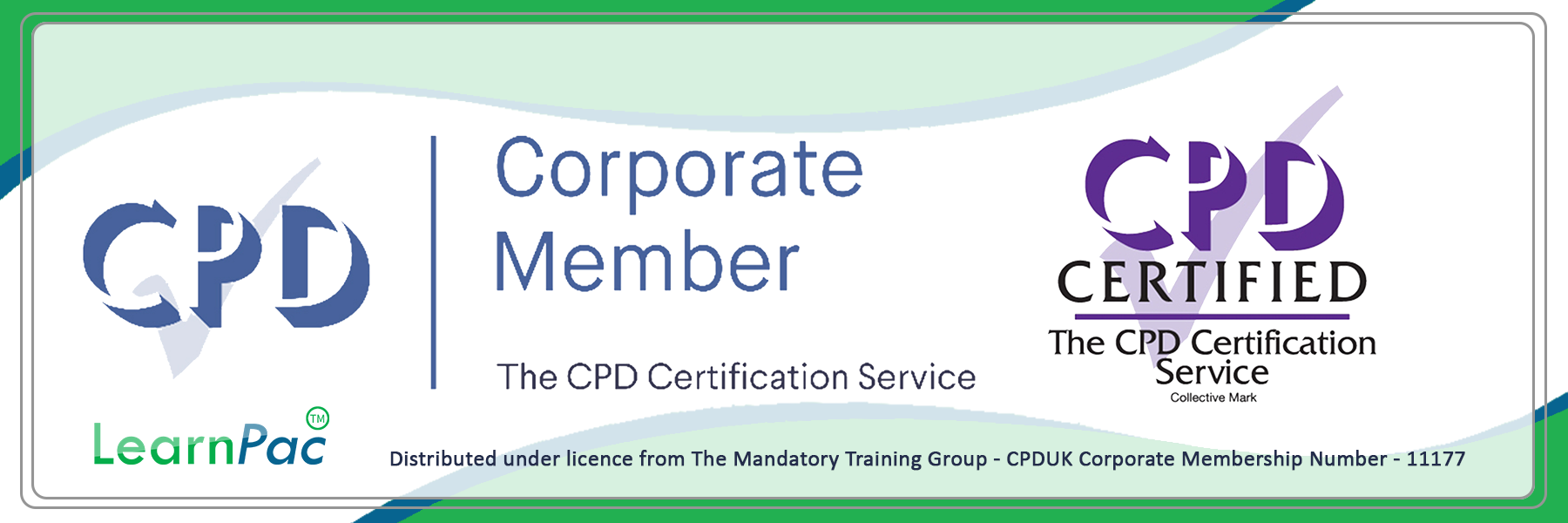Managing Violence and Aggression - E-Learning Courses - CPDUK Accredited

Managing Violence and Aggression – E-Learning Courses with Certificates – CPDUK Accredited.
LearnPac Systems is the leading UK provider of accredited statutory and mandatory training courses for all sectors, including health and social care, education, local government, private and charity sectors.
Managing violence and aggression e-learning courses explores the causes of challenging behaviour within the required setting and pro-active strategies for reducing behaviours, dynamic risk assessment principles to help staff recognise the appropriate course of action and then the law regarding physical intervention.
Our managing violence and aggression e-learning courses provide guidance on the development of documentation to ensure the effective assessment and management of violence and aggression.
Browse our Managing Violence and Aggression - E-Learning Courses
Managing Violence and Aggression: Frequently Asked Questions and Answers
Managing Violence and Aggression – E-Learning Courses with Certificates – CPDUK Accredited – LearnPac Systems UK.
Here at LearnPac Systems, we receive many questions about managing violence and aggression. We have provided answers to the most frequently asked questions about managing violence and aggression.
Click on the text below to see the answers to the Frequently Ask Questions about Managing Violence and Aggression.
Violence is the use of physical force to injure, abuse, damage, or destroy. Less conventional definitions are also used, such as the World Health Organisation’s definition of violence as “the intentional use of physical force or power, threatened or actual, against oneself, another person, or against a group or community, which either results in or has a high likelihood of resulting in injury, death, psychological harm, maldevelopment, or deprivation”.
LearnPac Systems is the leading UK provider of accredited statutory and mandatory training courses for all sectors, including health and social care, education, local government, private and charity sectors.
Click here for Handling Violence and Aggression – Online Course – CPD Accredited
Violent behaviour refers to physically harming others, or causing them to fear harm from you. It comes in many forms, and drugs and alcohol usually make violent behaviour worse. Generally, violent behaviour often begins with verbal threats but escalates to involve physical harm over time.
LearnPac Systems is the leading UK provider of accredited statutory and mandatory training courses for all sectors, including health and social care, education, local government, private and charity sectors.
Click here for Conflict Resolution in Health and Care – Online Course – CPD Accredited
Exposure to youth violence and school violence can lead to a broad range of adverse health behaviours and outcomes, including alcohol and drug use and suicide. Depression, anxiety, and many other psychological problems, including fear, can result from school violence.
Family violence is when someone uses abusive behaviour to control and/or harm a member of their family, or someone with whom they have an intimate relationship. Family violence includes many different forms of physical and emotional abuse, as well as neglect carried out by family members or intimate partners.
Violence can lead to premature death and can cause nonfatal injuries. People who survive violent crime endure physical pain and suffering, as well as mental distress and reduced quality of life. Repeated exposure to violence and aggression may be linked to increased negative health outcomes.
The following factors can provoke aggressive behaviour:
- Physical health
- Mental health
- Family structure
- Relationships with others
- Work or school environment
- Societal or socioeconomic factors
- Individual traits
- Life experiences.
Aggression and violence are terms often used interchangeably. However, the two differ. Violence can be defined as the use of physical force with the intent to injure another person or destroy property. In contrast, aggression is generally defined as angry or violent feelings or behaviour.
Prevention Management of Violence and Aggression (PMVA) is an essential requirement when working within any mental health environment.
Breakaway training is a way of protecting yourself and those around you when confronted with threatening situations. There are similarities between this type of training and self-defence in the way that it consists of protection and breakaway techniques in circumstances of aggression and physical assault.
LearnPac Systems is the leading UK provider of accredited statutory and mandatory training courses for all sectors, including health and social care, education, local government, private and charity sectors.
Click here for Work-Life Balance Training – Online Training Course – CPD Accredited
Dealing with an aggressive patient takes care, judgement and self-control. Therefore, it is essential to consider the following reminders:
- Remain calm, listen to what they are saying, and ask open-ended questions.
- Reassure them and acknowledge their grievances.
- Provide them with an opportunity to explain what has angered them.
- Maintain eye contact but not prolonged.
The three types of aggression are as follows:
- Reactive-expressive (Verbal and physical aggression)
- Reactive-inexpressive (Hostility)
- Proactive-relational aggression.
There are five things that healthcare professionals can do to communicate with an angry patient. These include:
- Taking a deep breath
- Doing your homework before meeting
- Listening
- Going over things again
- Closing the loop.
Decades of research have demonstrated that both genetic and environmental factors play a role in a variety of behaviours in humans and animals (e.g. Grigorenko & Sternberg, 2003). The genetic basis of aggression, however, remains poorly understood.
When children become aggressive, they often do so because they have difficulty dealing with their anxiety or frustration and can’t verbalise their feelings as others do. The aggression may also be a form of impulsivity.
A genetic abnormality may help explain why some people are more prone to feelings of anxiety and aggression than others. However, researchers say that until now, it is unknown whether a genetic defect causes these serotonin cells to malfunction.
Confrontational questions are a tool used by passive-aggressive people to pick holes in your ideas and actions. The aim is to undermine and belittle you so that you will overreact and appear to be unreasonable.
The first step in preventing violence is to understand the “who”, “what”, “when”, “where” and “how” associated with it. Grasping the magnitude of the problem involves analysing data such as the number of violence-related behaviours, injuries, and deaths.
There are many reasons why patients can become aggressive in the hospital. In other cases, patients become aggressive because of their situation. They may feel a loss of control over their medical condition and that combined with emotions such as fear and anxiety leads to displaced anger or aggression.
It is not uncommon for a dementia patient to engage in aggressive and sometimes violent actions toward another resident or a person taking care of them. Outside factors such as physical discomfort or pain, being in an unfamiliar environment or situation, and even poor communication can all trigger aggression.
These courses should be completed by those who work in health and social care services, including:
- NHS medical, nursing, AHP and care staff
- Locum doctors and nurses
- Locum allied health professionals (AHPs)
- Agency nurses
- Agency workers
- Healthcare Assistants (HCAs)
- Support workers
- Care assistants
- Community services.
LearnPac Systems is the leading UK provider of accredited statutory and mandatory training courses for all sectors, including health and social care, education, local government, private and charity sectors.
Click here for more Managing Violence and Aggression E-Learning Courses
On successful completion of each of the managing violence and aggression courses modules, you will be able to download, save and/or print a quality assured continuing professional development (CPD) certificate. Our CPD certificates are recognised internationally and can be used to provide evidence for compliance and audit.
The CPD Certification Service (CPDUK) accredits all of our statutory and mandatory training courses as conforming to universally accepted Continuous Professional Development (CPD) guidelines.
LearnPac Systems is distributed under the licence from The Mandatory Training Group – CPDUK Corporate Memebrship Number – 1117.




